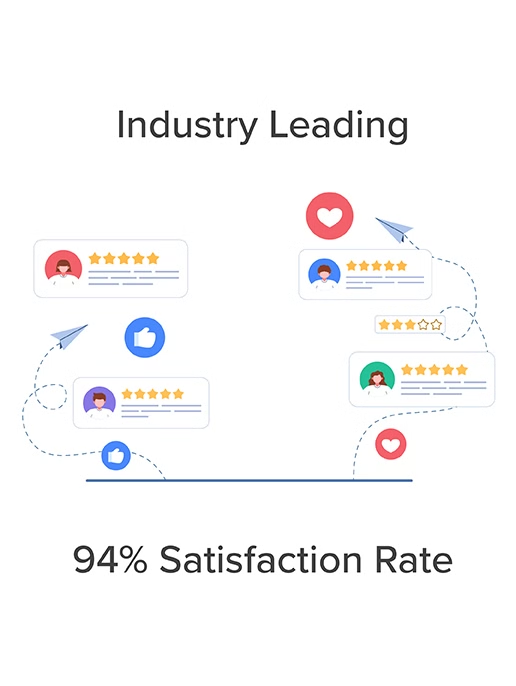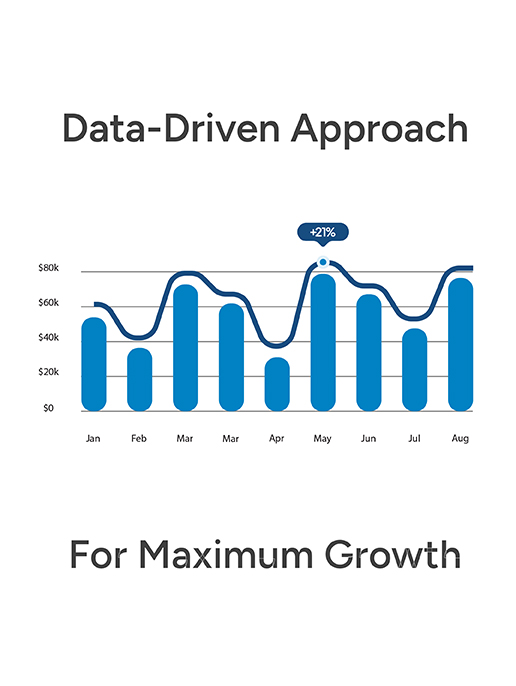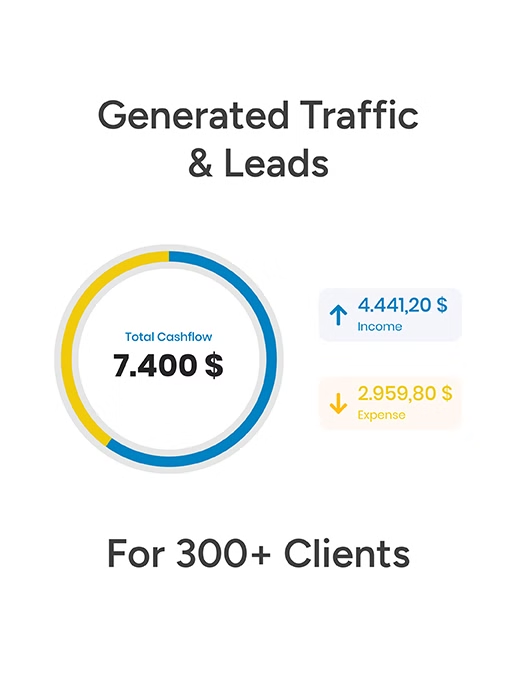


With our WordPress development services, we create scalable solutions. We use WordPress to create engaging, conversion-focused websites that are easy to manage.
We focus on creating performance-optimized WordPress websites with speedy load times and a smooth user experience that is guaranteed to increase conversions from your website.
With us, your website won’t limit your business’s growth. Whether you want to add new features or e-commerce functionalities, we can help you implement them without a complete rebuild.

Get performance-optimized sites with our WordPress development services. When developing your website, we follow the best WordPress development practices to create a performance-optimized website.
From initial keyword research to ongoing SEO optimization, we create WordPress websites guaranteed to generate organic traffic and conversions.
We also provide ongoing WordPress maintenance to keep your website secure and updated. With us taking care of your website, you can focus on operating your business rather than managing your website.
Drive increased user engagement and conversions with our WordPress website development experience. Our team of experienced WordPress developers engaging, user-friendly websites guaranteed to generate results.
Whether you’re looking for an online store, a subscription site, or a blog, we deliver tailored solutions that exceed your expectations.
We’re committed to excellence, delivering a website and a powerful online platform that promotes your business growth. With our continuous support, your WordPress site stays updated, driving results well into the future.

We often send out our newsletter with news and great offers. We will never disclose your data to third parties and you can unsubscribe from the newsletter at any time.
Unfortunately, we’re unable to offer free samples. As a retailer, we buy all magazines from their publishers at the regular trade price. However, you could contact the magazine’s publisher directly to ask if they can send you a free copy.
You can create a new account at the end of the order process or on the following page. You can view all of your orders and subscriptions in your customer account. You can also change your addresses and your password.
No, you don’t have to create an account. But there are a few advantages if you create an account.
You never have to enter your billing and shipping address again
Find all of your orders, subscriptions and addresses in your account
Download invoices of your orders
No, we don’t have a physical store location at the moment. We accept only orders through our online shop and we’re shipping all orders with the Swiss Post Service. Please visit our shipping section for more details.
From time to time you will find us at design fairs and popup markets in Switzerland. Subscribe to our newsletter and you’ll receive the latest news.
Unlike traditional WordPress development agencies, we focus on creating personalized experiences for each client. We don’t just build websites; we build partnerships. We can make a perfect website for your brand by understanding your vision and goals. This personalized approach means your site will stand out in design and functionality.
Our team of WordPress web designers is constantly updated with the latest WordPress trends to ensure performance-optimized solutions for every business. Our industry-leading customer satisfaction reflects our commitment to our customers’ success.
Yes! No matter your industry or niche, we’re here to create a WordPress website tailored just for you. We will work with you to understand what makes your business tick, who your customers are, and what you want to achieve. This way, we can deliver a website that exceeds your expectations and goals.
We research your industry, check the competition, and set benchmarks. We aim to create a website that meets industry standards and sets new ones. As a leading WordPress web development agency, we’re all about building a site as unique as your business, helping you stand out and connect with your audience.
Our WordPress designers work on your website mobile-first. After we deploy the first build, we test the site on different screens, such as phones, tablets, and desktops, to ensure it looks good and is easy to use regardless of size.
We also pay attention to how quickly the site loads on mobile devices. No one likes to wait, so we make images smaller without losing quality and use the best practices to optimize your website. We’re always looking for ways to create a mobile-friendly, pleasant, and fast website for users on the go.
We follow the best security practices during development to protect your website from threats. As part of our WordPress website maintenance packages, we ensure your website is constantly updated and protected from attackers.
We perform regular security audits to ensure your WordPress website has no underlying security issues. With us taking care of your website’s security and maintenance needs, you can rest easy knowing that your website is in excellent hands.
As a leading custom WordPress development services provider, we understand the importance of search engine optimization for websites. We take a comprehensive approach to SEO during our website development process. After working with you to understand your business and target audience, we conduct thorough keyword research to find the most valuable keywords related to your business.
Our experienced copywriters then write and optimize your website’s content around these keywords to ensure your site meets visitors’ search intentions. Afterward, our WordPress developers follow standard SEO practices to insert these keywords into your website. They follow the best technical SEO practices to make it easier for search engines to discover your content.
On-site SEO goes beyond keyword research and content optimization. From the start of the custom WordPress website development process, we consider the website’s speed and user experience. We create websites that provide a smooth user experience with ultra-fast loading times to increase user engagement.
As user experience is an important ranking signal, search engines rank these websites higher. Most importantly, by addressing users’ needs, we ensure your website converts at an above-average rate to boost your bottom line.
Search engine optimization isn’t a one-time task, and we regularly monitor your website to ensure it keeps up with the new algorithm changes. We also track whether your website ranks for the targeted keywords and adjust our approach whenever necessary. This comprehensive approach will help your website improve its visibility in search results and drive organic traffic.
Moving content from an existing platform to another can be daunting. However, we’ve got years of experience building successful WordPress websites to ensure a smooth transition.
Before we start migrating your current website’s content to WordPress, we analyze your site’s structure closely. This helps us understand how your current content is organized and ensures we can replicate and improve it on your WordPress website.
After this, we move your content carefully to ensure nothing gets lost during the transition process. This includes your text, images, videos, and any other media. We pay special attention to maintaining your SEO rankings. By setting up proper redirects and keeping your URL structures intact, we help preserve your search engine presence.
Throughout this process, we aim to minimize downtime for your website because we know every minute your site is offline can mean lost opportunities. With careful planning and execution, we transfer your website without errors to ensure you can enjoy your new WordPress site immediately.
Absolutely! We typically use WooCommerce, a powerful plugin that transforms your site into a fully functional online store. Our approach involves tailoring the store’s look and feel to reflect your brand’s identity, ensuring that payment processes are secure and reliable, and making the shopping process easy for your customers to navigate. We’ll work with you to set up efficient product pages, shopping carts, and check-out procedures that provide a pleasant shopping experience.
Speed is crucial for any website, and we’re here to help make your WordPress site as fast as possible. Our team takes a comprehensive approach to speed optimization. This includes reducing the file size of images without losing quality, minifying CSS and JavaScript files to decrease load time, and setting up caching to make the website faster for returning visitors. We also evaluate hosting options to find one that offers the best performance for your site’s specific needs, and we might suggest using a CDN, which stores your site on servers worldwide so it loads quickly no matter where your users are. We’re committed to fine-tuning your site’s performance to enhance user experience and improve search engine rankings.
We have a clear and client-friendly policy for making revisions and changes during the WordPress website development process. We understand that as your vision for your website takes shape, tweak certain elements. That’s why we allow a predefined number of revisions at no extra cost.
Here’s how it works: at the start of the project, we’ll discuss your needs and expectations. Then, as we progress through the design and development phases, we will present our work to you in critical milestones. This is your opportunity to give us your feedback. We’ll listen carefully to what you have to say and make the necessary changes to ensure the final website meets your approval. We always aim to create a website that looks great and fulfills all your business needs.
When you face technical issues with your WordPress website, you can count on our support team to be there for you. We know how frustrating technical problems can be, so we’ve made it easy for you to get help when needed. Depending on your convenience, you can contact us through various channels, including email, phone, or a dedicated support channel.
Once we receive your report, our experienced technicians will identify the problem and fix it. They’re well-versed in WordPress and can quickly troubleshoot common and complex issues. We also provide you with resources and guidance on best practices to help prevent future problems. This proactive approach is designed to keep your website running smoothly so you can focus on your business without worrying about technical glitches.
